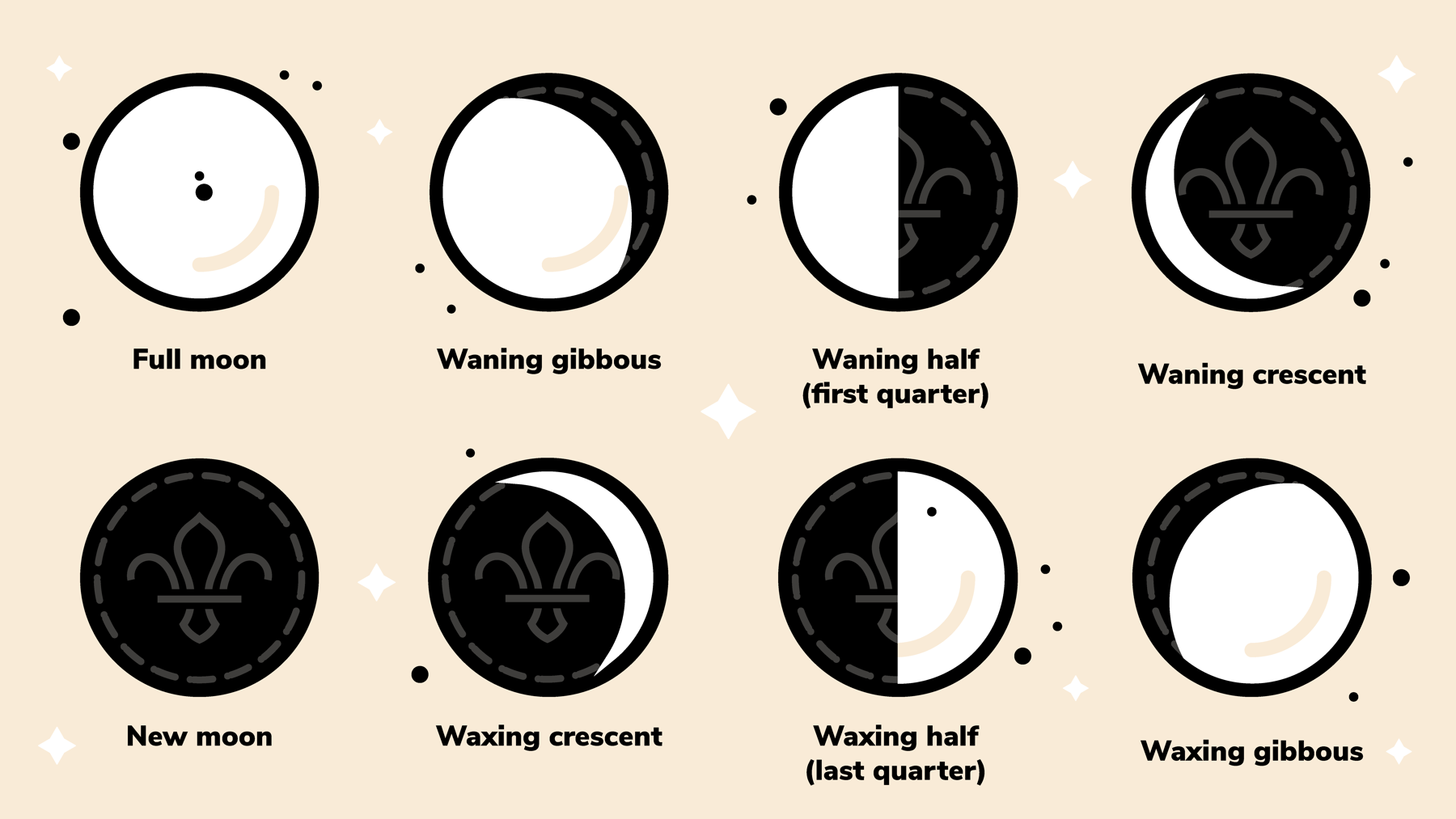
Make some biscuit moons
You’ll need
- Spoons
- At least one cream filled biscuit for each person

Before you begin
- Use the safety checklist to help you plan and risk assess your activity. Additional help to carry out your risk assessment, including examples can be found here. Don’t forget to make sure all young people and adults involved in the activity know how to take part safely.
- Make sure you’ll have enough adult helpers. You may need some parents and carers to help if you’re short on helpers.
- You could use jam and cream biscuits, Oreo biscuits or Golden Crunch biscuits for this activity.
- Another way to do this activity is to use Jaffa Cakes, or a similar biscuit, and take bites out of the biscuit to show the different stages of the moon, such as a full moon, a half moon, a crescent moon and no moon.
- Remember to check for allergies or dietary requirements, and adjust as needed. This may include ensuring no cross-contamination, too.
- Be conscious about who may be fasting – you may want to plan this activity for when everyone can get involved.
Talk about the moon in Islam
- Talk about how in Islam, the Moon, the Sun and the stars are very important. The Sun determines prayer times, and the Moon is used to work out the Islamic calendar. The stars can be used to find the direction of Mecca (known as the Qibla). Mecca is which Muslims pray to, as it’s considered the holiest city in Islam.
- Ask if anyone knows anything about the Moon, and why we see it as different shapes.
- Explain that there are different phases of the Moon. As the Moon orbits the Earth, we see a different amount of the Moon reflecting the Sun’s light. This means the Moon looks like it’s changing shapes, even though it’s always a ball shape. The different stages are called phases.
- Ask everyone to look at the image showing the eight phases of the moon. Ask if anyone has heard of any different terms used to describe the phases of the Moon.
- Explain that these terms are
- Waxing (when the Moon appears to be growing in size)
- Waning (when the Moon appears to be shrinking)
- Gibbous (when more than half of the Moon is illuminated)
- Ask if anyone knows when a new month begins in the Islamic calendar. In the Islamic calendar, a month begins with the sighting of the new crescent Moon. One of these months is Ramadan.
- Which of the eight phases of the moon does a new crescent moon fall in? The new crescent moon falls in the 'waxing crescent' phase, where the Moon appears to be growing in size.
Create your biscuit Moon
- Everyone should wash their hands.
- Give everyone a biscuit that’s filled with cream.
- Everyone should split the biscuit into two parts, either side of the cream, so you have two biscuit bases or crusts. The easiest way to do this is by gently twisting them apart.
- Choose the side with the most cream on to keep. Move some of the cream filling over to the half you're keeping, if needed.
- Everyone should get rid of the half of the biscuit that has the least cream filling on, such as by eating it!
- Everyone should take the remaining half of their biscuit and use the end of a spoon to make the cream filling look like a new crescent Moon.
- Once everyone’s made and compared their biscuit Moons, they can eat them.
- If you’ve enough biscuits, you could repeat the activity in pairs. Everyone should choose a phase of the Moon to create, before using a biscuit to make it. Once made, they should show it to their friend and their friend should guess the phase of the moon that’s been created. Then the biscuit can be eaten!
- Islam is the second largest religion in the world, with over 1.8 billion followers, who are called Muslims. It’s also the second largest religion in the UK.
- Muslims believe there is one true God, who’s called Allah (the Arabic word for God).
- Islam uses a calendar based on the cycles of the Moon. In the Islamic calendar, a month begins with the sighting of the new crescent Moon.
- Ramadan is the ninth month of the Islamic calendar. The exact dates of Ramadan change every year.
- Ramadan remembers the month the Qur'an (the holy book of Islam) was first revealed to the Prophet Muhammad. Muslims believe that Muhammad was the last prophet sent by Allah.
- It's a very spiritual time for Muslims, and an important time for self-reflection and gratitude.
- It's the month when the Qur'an (the holy book of Islam) was first revealed to the Prophet Muhammad.
- It's a time for fasting, worship, service, coming together and spiritual development.
- In Islam, fasting involves going without eating or drinking anything from sunrise to sunset. Several groups of people aren’t required to fast, including children, the elderly, people who are menstruating, people who are pregnant or breastfeeding, and people who are ill.
- During Ramadan, it’s common to have one meal just before dawn (known as the suhoor). You then have another (known as the iftar), directly after sunset.
- The end of Ramadan is marked by a big celebration called 'Eid al-Fitr' (the Festival of the Breaking of the Fast). Mosques hold special services and a special meal is eaten during daytime (the first daytime meal for a month).
Reflection
This activity was all about learning about the different phases of the moon, and the importance of the sky in Islam. Can you think of any other links between people’s faith and beliefs and astronomy? For example, in Christianity, the three wise men were guided by a star in the nativity.
Why is it important for people to learn about each other's faiths and beliefs, even if we don’t have a faith ourselves. It can help us understand, respect and relate to others, and it also gives us opportunity to reflect on our own personal beliefs and values. One of the Scout values is belief - Scouts always respect people’s beliefs, faiths and cultures, and everyone should be open to learn.
What does the sky mean to you? How do they link to your faith, beliefs, values, mindfulness, spirituality or sense of self?
Safety
All activities must be safely managed. You must complete a thorough risk assessment and take appropriate steps to reduce risk. Use the safety checklist to help you plan and risk assess your activity. Always get approval for the activity, and have suitable supervision and an InTouch process.
- Food
Remember to check for allergies, eating problems, fasting or dietary requirements and adjust the recipe as needed. Make sure you’ve suitable areas for storing and preparing food and avoid cross contamination of different foods. Take a look at our guidance on food safety and hygiene.
- Be conscious about who may be fasting – you may want to plan this activity for when everyone can get involved. You could paint the phases of the moon, instead of making them out of biscuits.
- Remember to check for allergies or dietary requirements, and adjust as needed. This may include ensuring no cross-contamination, too.
- Many shops have a 'free from' section, where you can find biscuits that don't contain things like gluten, milk or egg.
- If you can’t get cream filled biscuits to meet everyone’s dietary requirements, people could nibble any other suitable biscuit until it’s the right shape for the phase of the moon they’re trying to create.
- If anyone needs help or struggles with fine motor skills, give them the opportunity to work in pairs, either with another young person, with a young leader or an adult volunteer. The person they’re working with can help with the parts they find fiddly to do or tricky.
All Scout activities should be inclusive and accessible.